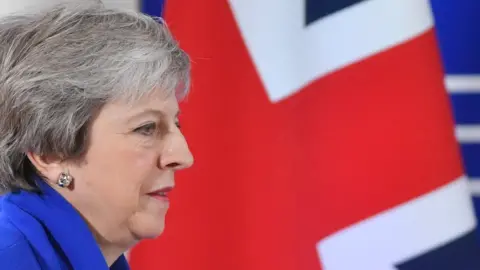Theresa May's Brexit message: 'This is all there is'
 AFP
AFPThe talking in Brussels is done. After nearly two years of negotiations, arguments - and the inevitable moments where it felt like the process would explode - there is, now, a deal.
It's a compromise. It was always going to be. It's not a happy compromise either. People on both sides of the Brexit argument are already screaming their protests.
And although the prime minister must be relieved, she didn't exactly say that she was pleased about the deal when I asked her at a news conference this lunchtime.
Instead, she said she was sure the country's best days are ahead.
But however she really feels about it - and with this prime minister it is hard to tell - her strategy for the next couple of weeks is crystal clear. Her case? This is all there is.
With the explicit backing of almost every European leader who has opened their mouth today, this is the "only deal", the "best possible deal", "the max".
The message to MPs from Theresa May and her counterparts: don't kid yourselves if you think something else might magically appear if you vote it down.
And the message to the public? Just let me get on with it, then we can all stop talking about Brexit - please.
Again today she used the platform to "talk directly to the British public", to explain how her (now rather pink) red lines, on "money, laws and borders", have been followed.
It's her Brexit with caveats, with a lot to be sorted out about the future, in the future. You can remind yourself what's actually in the deal here.
And No 10 is all too aware that dozens and dozens of their own MPs hate it. Theresa May has reached her imperfect compromise at a moment when in Parliament both sides are hardening against the idea of compromising at all.
For two years Theresa May has survived by tacking one way, then another. But now the deal is on paper, in black and white, that approach can't go on.
A senior government figure said privately that No 10 was past the point of trying to please everyone. And of course, everyone in government is all too aware that it is likely that the deal will be rejected by Parliament in any case.
But the only potential route through for the prime minister is through the middle, to look like, as one senior Whitehall official describes it, "the adult in a world of children".
However the prime minister looks, however she sounds in the next fortnight, the levels of unhappiness at home are so profound that her pleas may fall on deaf ears.
If the deal falls, she - and her government - may fall with it. Scrape it through then she'll have pulled off a feat far harder than getting the actual deal done.
PS: Here's a great explanation from my colleague Ben Wright about what might happen if the vote, which we expect on 12 December, doesn't pass the deal.
